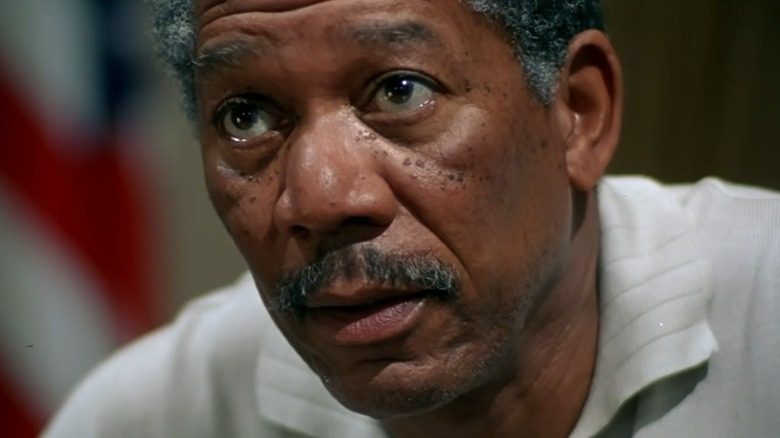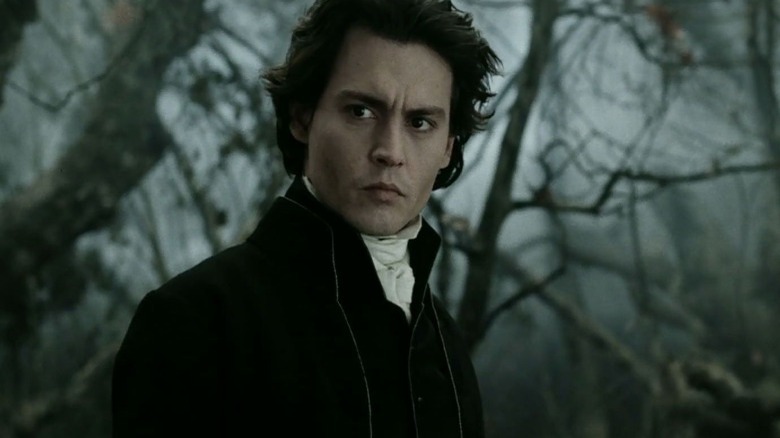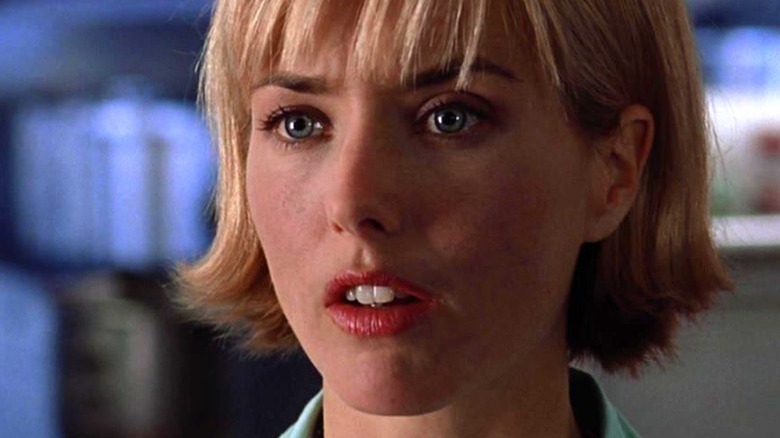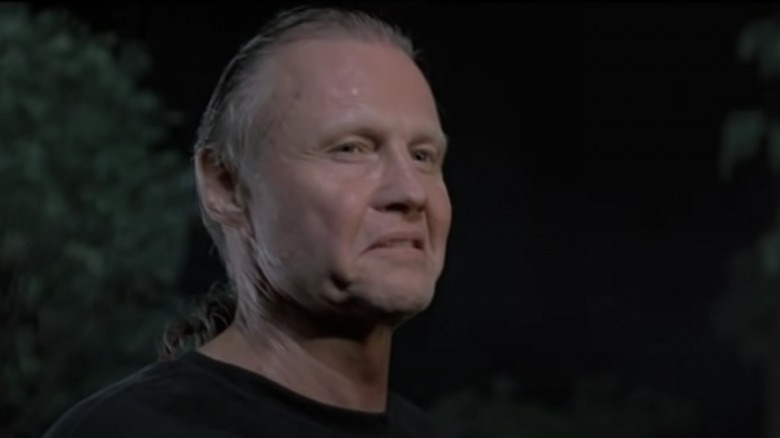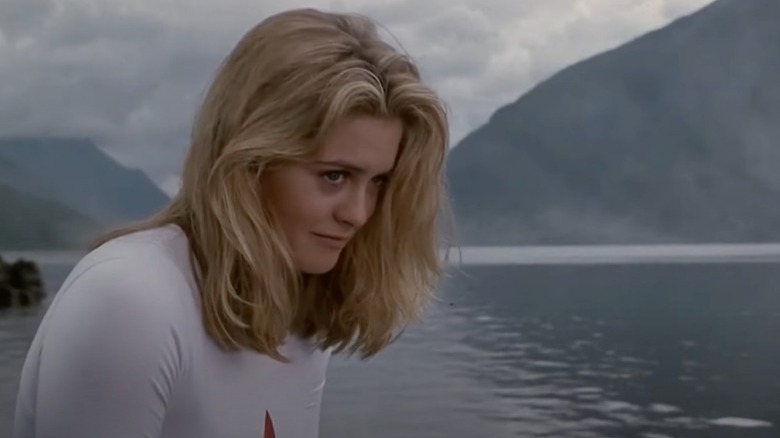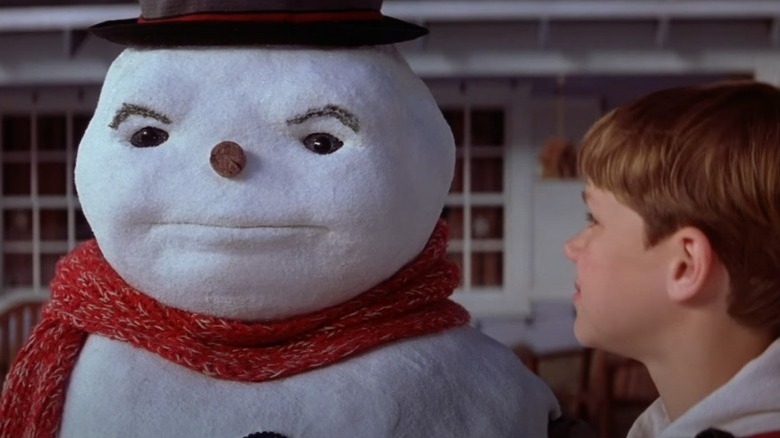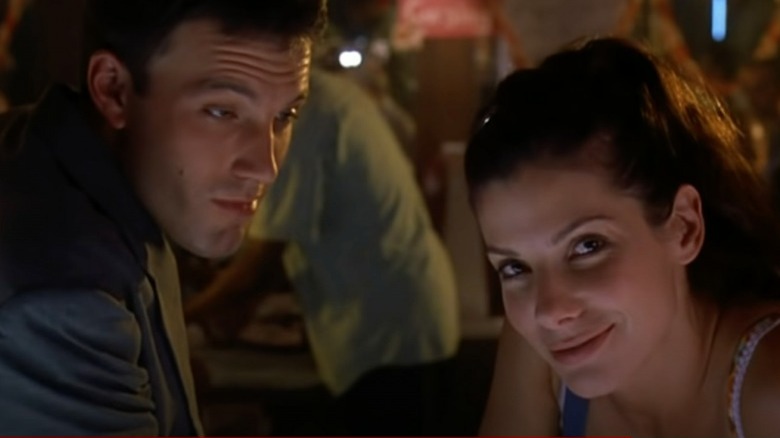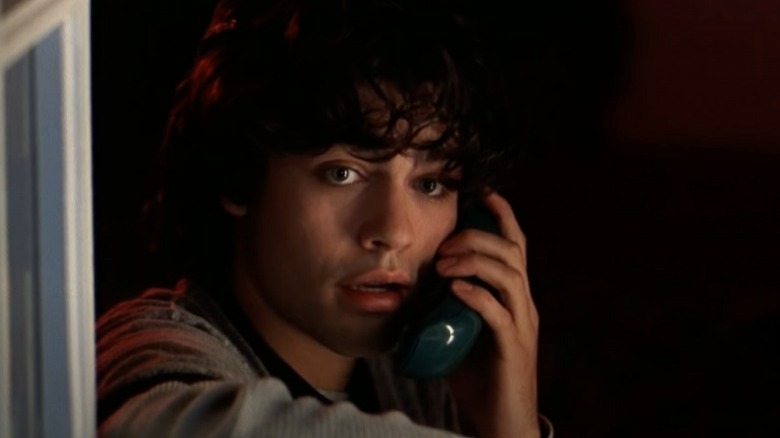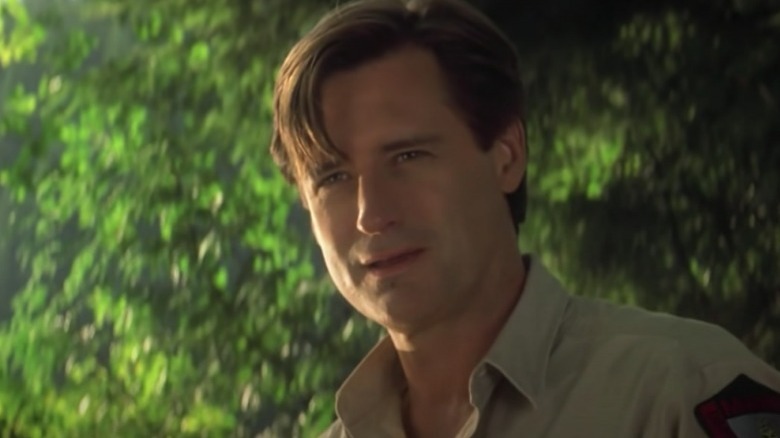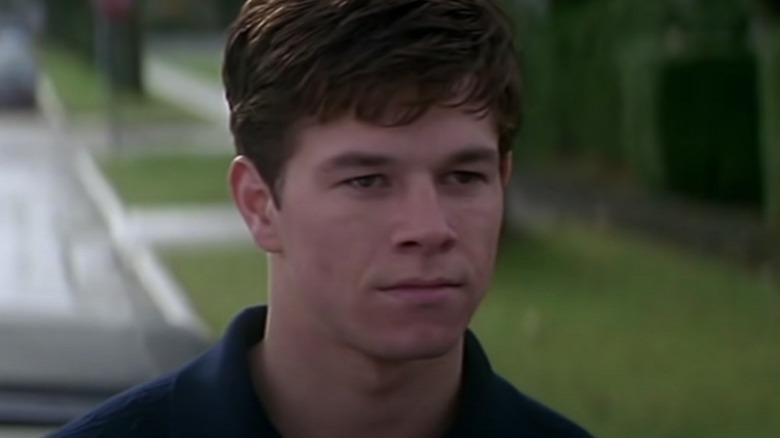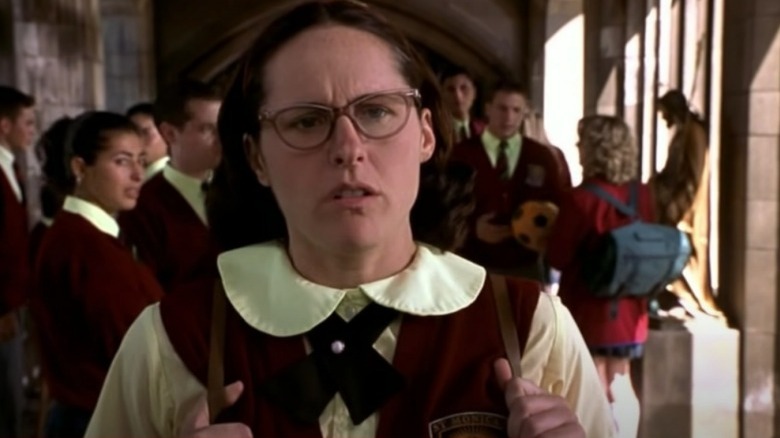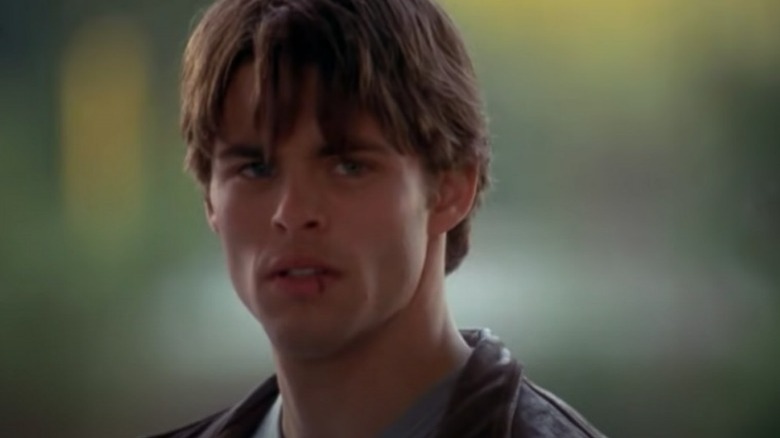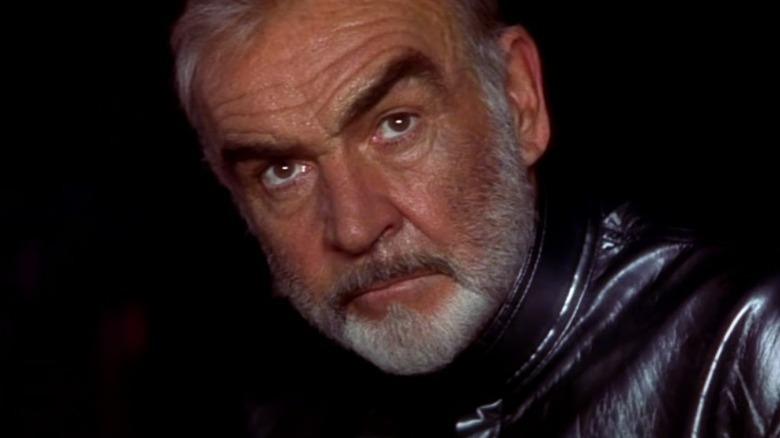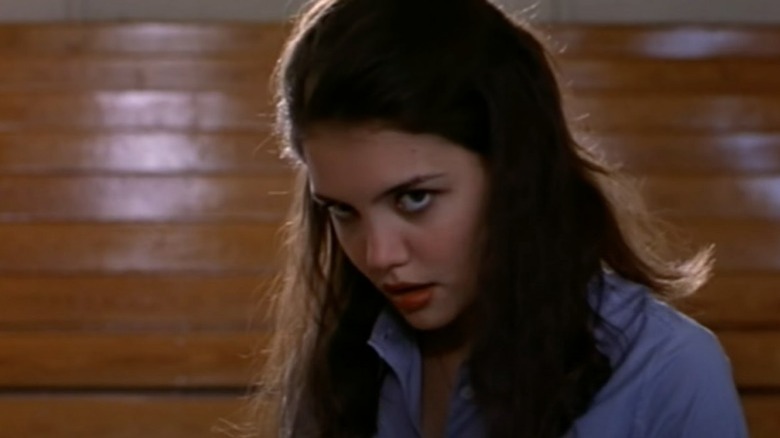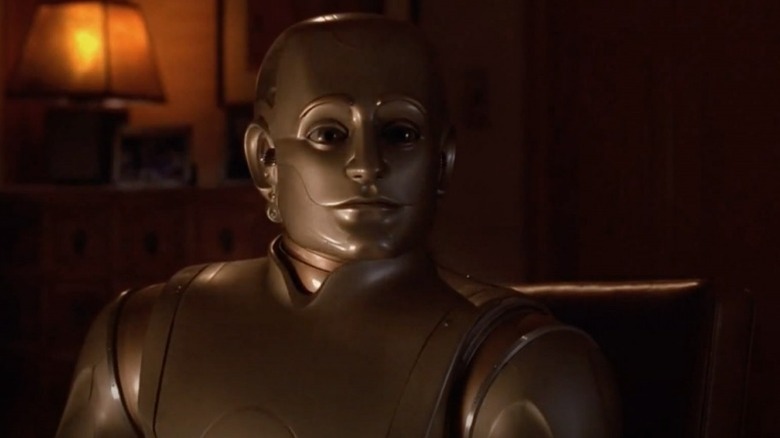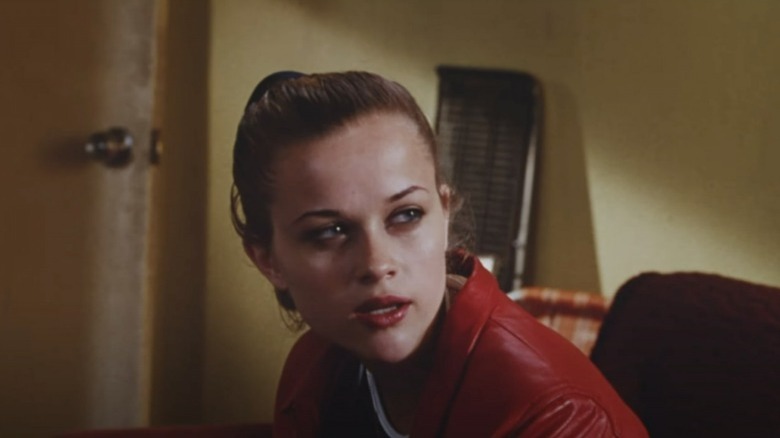'90s Movies We Loved As Teenagers But Will Never Watch Again
In the earliest days of the COVID-19 pandemic, people around the world began to shelter in place. Many passed this anxious time by crafting sourdough starters, Zooming with family, and watching an inordinate amount of movies.
Consuming content became a welcome distraction and the arrival of streaming platforms such as Disney+, HBO Max, and Peacock presented viewers with dense libraries of movies at their fingertips. Many people coped with the uncertainty mounting outside their doors by leaning into nostalgia and revisiting movies they loved from their adolescence and teenage years. Some of those movies hold up well upon a rewatch, offering potent reminders of what initially drew us to them in the first place.
However, others prove that time can be quite cruel. Whether it's dated visual effects or the fact that another similar movie has since stolen its thunder, here are some films that we loved in the '90s but will never watch again.
Sleepy Hollow
Washington Irving's story "The Legend of Sleepy Hollow" has been adapted numerous times. However, one of the most notable iterations is Tim Burton's 1999 film "Sleepy Hollow," starring the director's most frequent collaborator Johnny Depp as Ichabod Crane. Fans of Burton who grew up with his revered gothic classics "Edward Scissorhands," "The Nightmare Before Christmas," and "Batman Returns," were eager to see the auteur try his hand at R-rated horror movie and he certainly delivered upon the movie's tagline: "Heads Will Roll."
Despite triumph at the box office, generally positive reviews from critics, and three Academy Award nominations (including one win for Peter Young and Rick Heinrichs' exquisite art direction), the movie seemed to disappear into its own foggy atmospherics following its release. "Sleepy Hollow" remains a visually stunning achievement and it certainly has its fans, but it has failed to garner the kind of fandom to land it on lists of the best movies to watch around Halloween.
Deep Impact
From the tornadoes of "Twister" to the volcanic eruption in "Dante's Peak," planet Earth seemed to be under a consistent assault in 1990s cinema. The disaster films genre is rich in unforgettable scenes of nature's fury and destruction, but Mimi Leder's giant-comet-headed-toward-earth action thriller seemed to implode in the cultural zeitgeist after everyone saw it for the first time.
"Deep Impact" enjoyed early success at the start of the 1998 summer, but then the worst thing that could happen to the movie arrived a month later — the release of Michael Bay's "Armageddon." Although critics were harsher on "Armageddon," it outshined "Deep Impact" in two vital ways. At the end of the day, Bay's film had more consistent action set pieces with stronger production value and featured characters we are made to care about. The only enduring action in "Deep Impact" arrives late in the final act when a comet strikes the Atlantic Ocean and triggers an enormous tidal wave that barrels the eastern seaboard of the United States. This leads to the movie's famous sequence of New York City being swallowed by the terrifying wave.
Unfortunately, everything before the comet's arrival is a bit of a slog, as "Deep Impact" features an unnecessarily large ensemble cast occupying fractured storylines, all deprived of the specificity necessary to create compelling characters.
Anaconda
The recipient of six Golden Raspberry (Razzie) Award nominations, including worst couple for Jon Voight and his animatronic snake scene partner, "Anaconda" is something of a legend. Jennifer Lopez, Ice Cube, and Owen Wilson star as members of a film crew shooting a documentary about a lost tribe in the Amazon. They cross paths with a snake hunter (Voight) who offers to help them but instead takes them hostage and hoodwinks them into helping him track down a legendary, enormous green anaconda deep in the jungle.
Dismal reviews from critics did not hinder the film's performance at the box office, likely fueled by must-see-how-bad-it-is word of mouth. The comically large, sometimes animatronic, sometimes CGI anaconda is vindictive to the point of pettiness, screeching like a pterodactyl as it plucks off the crew one by one. While these scenes are genuinely hilarious and entertaining, the remainder of the movie is a snooze. Voight is the only actor who seems to have understood the assignment, whereas the rest of the cast plays the bonkers script way too seriously.
Hopefully, the rumored "Anaconda" reboot will embrace humor more than the original which, like its serpent cinematic cousin, "Snakes on a Plane," proved to only warrant one watch.
Excess Baggage
Everyone waited with bated breath to see how Alicia Silverstone would follow up her performance in "Clueless," arguably one of the best high school movies of all time. As such, It was no surprise that "Excess Baggage" caved under these unreasonably high expectations. Although the movie notoriously bombed at the box office and in critics' estimations alike, it remained popular among Silverstone diehards who were thrilled to see the actress try her hand at a more dramatic turn as a testy rebel who is kidnapped by car thief Vincent (Benicio del Toro).
"Excess Baggage" failed to earn any retroactive admiration during the semi-recent re-evaluation of "Clueless" published in Vanity Fair, which deemed the film less of a stellar high school movie and more of a comedic masterpiece. Not even a peculiar cast featuring Christopher Walken, Harry Connick Jr., and Sally Kirkland could prevent the tonally uneven, formulaic crime-comedy from becoming a forgotten relic of the 1990s.
Jack Frost
From classics like "A Christmas Story" and "It's a Wonderful Life," to more recent hits like "Elf," the holiday film genre is chockfull of Christmas movies that viewers return to year after year. Following in the vein of "Home Alone" and "The Santa Clause" franchise, Troy Miller's 1998 family fantasy "Jack Frost" failed to secure a spot in the pantheon of holiday movies.
In perhaps the movie's fatal flaw, "Jack Frost" begins with the grim death of a semi-absent father (Michael Keaton), setting a fairly morbid, somber tone from the start that progressively suffocates the story as it trudges along. The father's spirit returns in the form of a live, speaking snowman and tries to reconnect with his troubled son. Things just keep getting creepier from there as the movie spirals into a mess of unfunny slapstick humor, forced sentimentalism, and dated CGI. Ravaged by critics and considered a box office dud, "Jack Frost" is a movie many teens enjoyed in the 1990s with their families, but wisely have never returned to.
Forces of Nature
Bronwen Hughes' "Forces of Nature" was poised for success, even when it was met with harsh reviews from critics. This 1999 romantic comedy follows writer Ben Holmes (Ben Affleck) as he treks back to his hometown of Savannah, Georgia for his wedding. Ben's travel plans are upended when he crosses paths with free-spirited, offbeat Sarah (Sandra Bullock) on his flight before a seagull flies into their plane's jet engine, grounding them. When a brewing hurricane leads all other flights to be canceled, Ben and Sarah are forced to team up and find an alternate path south, leading to a screwball journey that leaves Ben questioning his commitment to his fiancée and their pending marriage.
Even when Ben and Sarah's hijinks veer cartoonish, "Forces of Nature" was a pleasant watch in the late 1990s due to Affleck and Bullock's sheer star power. But the movie is rarely discussed this side of the 21st century, likely due to a forgettable plot, Sarah's passé manic pixie dream girl characterization, and the fact that most of the transportation-based setbacks Ben and Sarah encounter have been alleviated due to various developments in technology. And perhaps someone's breath on set.
Drive Me Crazy
"Drive Me Crazy" is a prime example of how a movie can be forgotten when another one better executes the same conceit. Named after a 1999 Britney Spears song featured on its soundtrack (via Today), the Melissa Joan Hart and Adrian Grenier romantic comedy was released eight months after the similarly plotted and much more financially successful "She's All That." "Drive Me Crazy" never escaped its competitor's shadow. Hart was at the height of her popularity, right in the middle of her run as Sabrina on ABC's sensation "Sabrina the Teenage Witch," but this was Grier's mainstream breakthrough, having only starred in a handful of small independent films.
Although "Drive Me Crazy" faired worse with critics, "She's All That" was never bound for the Criterion Collection. The latter employs the same trite ugly duckling gets a makeover conceit as "Drive Me Crazy" with more success due to its stars' chemistry, which really makes or breaks these kinds of movies. Romantic leads Rachael Leigh Cook and Freddie Prinze Jr. had an undeniable charm that Hart and Grier simply could not match. With more realized characters, "She's All That" obfuscated "Drive Me Crazy" from the 1990s teen rom-com canon and even went on to inspire a gender-flipped Netflix remake, "He's All That."
Lake Placid
Following in the large, successful footsteps of "Jurassic Park" and "Godzilla," "Lake Placid" took a stab at the monster genre and, by most accounts, missed by a long shot. Still, the bizarre concept of an enormous 30-foot saltwater crocodile terrorizing the titular lake in upstate New York managed to draw curious audiences to the theaters. Despite a wickedly hilarious supporting performance delivered by the late, great Betty White, this creature feature's goofy thrills wore off quickly in retrospect.
It is virtually impossible to recall anything that happened in the movie apart from the infamous scene of White leading a blindfolded cow to its death on the shore of Lake Placid for the crocodile to consume in one vicious chomp. This is due to a heavy reliance on flat, B-movie characterization, aimless plotting, and a cheesy script that was inexplicably written by one of the most celebrated television writers, David E. Kelley.
Fear
James Foley's 1996 stalker drama "Fear" was a provocative must-see among teens at the time — with a grungy, Bush-heavy soundtrack to boot — but today its cringe-inducing dialogue and nonsensical plot reek of unintentional camp.
Characterized by one of its producers as "'Fatal Attraction' for teens" (via The Hollywood Reporter), the psychological thriller stars Mark Wahlberg as mysterious bad boy David and depicts the toxic relationship he pursues with his younger girlfriend, Nicole (Reese Witherspoon). Once Nicole's father digs into David's past and discovers David is not the person he claims to be, he tries to persuade his daughter to end things, only stoking unstable David's troubling temper.
In fairness, Wahlberg delivers a truly chilling performance as David develops an unhealthy obsession with Nicole, going so far as to give himself a tattoo in her honor, etching "NICOLE 4 EVA" into his chiseled pecs and abs. This sort of volatility was amusing to watch as a teenager, but today, it is difficult to enjoy "Fear," even on a hate-watching level, mostly due to its glib portrayal of psychological and physical abuse.
Superstar
"Saturday Night Live" movie spinoffs do not have the strongest track record, Bruce McCulloch's 1999 "Superstar" included. Molly Shannon's Catholic schoolgirl character, Mary Katherine Gallagher, remains one of the show's most beloved. Short comedy sketches proved to be the ideal forum for Shannon to play Mary Katherine, giving her the focused space to tap into the character's unpredictable intensity, off-putting social awkwardness, and physical comedy, frequently collapsing backward into stacks of metal chairs.
Expanding Shannon's character into a full-length feature heroine movie proved challenging, forcing "Superstar" to rely on long, drawn-out sight-gags that often suffocate the pacing. Perhaps the most uncomfortable of these is one in which Mary Katherine is caught by a nun while practicing kissing with tongue on a tree at school while personifying the tree. Teenagers in the 1990s often mimicked Mary Katherine's schticks and catchphrases, such as her habit of sticking her fingers under her armpits or shout-whispering "Superstar!" However, these are all prime examples of things we would rather leave in the late 1990s, along with this movie.
Disturbing Behavior
David Nutter's "Disturbing Behavior" arrived in theaters just a few months before Robert Rodriguez's more celebrated "The Faculty," but the latter eviscerated the former's reputation. The 1998 teen horror follows Steve (James Marsden) as he and his family relocate from Chicago to an idyllic town in Washington in the wake of their oldest son's tragic death. Steve is taken under the wing by outsiders Rachel (Katie Holmes) and Gavin (Nick Stahl), who warn him about getting recruited by the Blue Ribbons, a popular clique composed of cardigan-clad preppy kids who seem more like characters from a 1950s sitcom than 1990s students.
When the Blue Ribbons start demonstrating violent tendencies, Steve and company start investigating. They learn that the school psychologist is running an experiment on the Blue Ribbons using microchips to alter their behavior, transforming them from juvenile delinquents to upstanding citizens. It can be rewarding to revisit movies centered around a great plot twist to see the plot mechanisms take form, such as "Parasite" or "The Sixth Sense," but the revelation in "Disturbing Behavior" is too underwhelming and predictable to warrant another go. The dismal reviews from critics did not help matters.
Entrapment
Although Jon Amiel's 1999 crime caper "Entrapment" was a box office smash and Connery's James Bond legacy lends the movie a degree of gravitas, it never joined the ranks of its more exceptional heist movie peers. "Entrapment" lacks the clever plotting and rich characters that bring viewers back for a rewatch like Michael Mann's masterpiece "Heat" to Quentin Tarantino's cult favorite "Reservoir Dogs."
Catherine Zeta-Jones' star was already on the rise after her performance opposite Antonio Banderas in 1998's "The Mask of Zorro," but "Entrapment" expedited the ascent. In the crime caper, Zeta-Jones plays Virginia, an insurance investigator who goes undercover to track down a lost Rembrandt painting that she believes was stolen by notorious thief Robert (Sean Connery). The two double cross one another as they conspire to mount a heist in Malaysia, blurring the lines between who is really on the right side of the law. Although Zeta-Jones and Connery share some romantic sparks, the age gap between their characters has not aged well, and neither has "Entrapment."
Teaching Mrs. Tingle
After writing the screenplays for some of the most popular teen slasher movies from the 1990s, including "Scream," "I Know What You Did Last Summer," "Scream 2," and "The Faculty," Kevin Williamson was riding a huge wave of acclaim and expectation. For his directorial debut — and his last time in the director's chair since — Williamson returned to a screenplay he wrote prior to his rapid ascent to fame, originally titled "Killing Mrs. Tingle" that made it to theaters as "Teaching Mrs. Tingle" (via Salon).
The black comedy follows tenacious high school student Leigh Ann (Katie Holmes) as she enlists her friends (played by Barry Watson and Marisa Coughlan) to hold a reviled teacher Mrs. Tingle (Helen Mirren) hostage when she gives Leigh Ann a poor grade on a project, threatening to dethrone her status as class valedictorian.
The dark premise piqued the interest of every teenager who dreamt of seeking revenge on a mean teacher from high school, but considering the rise in school violence since its release, "Teaching Mrs. Tingle" now feels in poor taste. There was an undeniable novelty in seeing a revered actress like Mirren partake in something so low-brow, as well as in Holmes and Watson break bad from the characters they played on their teen drama sitcoms, "Dawson's Creek" and "7th Heaven", respectively. But saddled with a schlocky script and ghastly reviews, "Teaching Mrs. Tingle" was always doomed to be a one-and-done.
Bicentennial Man
Based on two stories by science-fiction literary master Isaac Asimov, Chris Columbus' 1999 fantasy drama "Bicentennial Man" stars the late Robin Williams. Thanks to costume and makeup design, Williams truly disappears into his role as Andrew Martin, a robotic domestic worker who yearns to become a human being.
However, what starts out as a charming, if sentimental, fish-out-of-water story quickly dissolves into maudlin existentialism as Andrew discovers the limits of his ability to emulate human feelings. The movie struggles to understand what it wants to communicate to its audience, employing increasingly emotionally manipulative tactics to entertain children and emotionally stir adults. Critics were mostly mixed on the film and the box office numbers were not encouraging.
Few actors had more prolific stretches of their career than Williams had in the 1990s, starring in family comedy blockbuster hits like "Jumanji," "Mrs. Doubtfire," and "Aladdin," but also serious work in dramas like "Good Will Hunting," for which he won an Academy Award for best supporting actor. Aside from a rare misstep in 1996's "Jack," Williams could seemingly do no wrong, but "Bicentennial Man" is too much of a bummer to deserve a second viewing, which is why, when it comes to Williams's best work, it is perennially absent from the conversation.
Freeway
Inspired by the classic fairytale "Little Red Riding Hood," writer and director Matthew Bright's "Freeway" featured a breakthrough performance from Reese Witherspoon that kicked off her prolific career. Witherspoon stars as Vanessa, a troubled teenager and Little Red Riding Hood surrogate who is left alone to fend for herself after her mother is arrested. She evades a social worker trying to help her and goes on the run to track down her elusive grandmother, unwittingly hitching a ride with wanted serial killer, the Big Bad Wolf of the story, Bob Wolverton (Kiefer Sutherland). The trip quickly descends into chaos, leading Vanessa to commit heinous acts of violence in the name of survival.
Produced by Oliver Stone, "Freeway" was favored by critics and audiences alike, but never garnered the level of fandom needed to catapult it into cult movie territory. The gritty road comedy thriller felt edgy and audacious when it debuted at the 1996 Sundance Film Festival, but feels antiquated by today's standards and has since virtually disappeared from public consciousness. "Freeway" is also largely absent from accounts of Witherspoon's career, likely overshadowed by crossover 1990s hits like "Cruel Intentions," "Pleasantville," and, perhaps her finest work, "Election.
